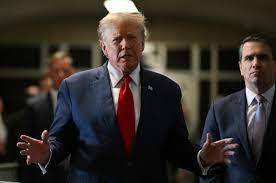Khaled Abou Zahr
There is a saying in Arabic: “A beggar with conditions.” It refers to someone who asks for charity but is picky about what forms of aid are acceptable or has specific demands while panhandling. This is exactly how many European politicians and heads of state that are reacting to Trump’s comments this week about NATO appear to be: beggars with conditions.
Let me explain. Trump declared that he would not, as a US president, agree to help defend a NATO member that was “delinquent” in its financial contributions to NATO. His comments provoked outrage. In a message posted on social media network X, the German Foreign Ministry highlighted the NATO creed, “One for all and all for one,” saying that it helps safeguard more than 950 million people, from Anchorage to Erzurum. Charles Michel, the president of the European Council, similarly criticized Trump for his “reckless” statements. He said they serve only the interests of Russian President Vladimir Putin by undermining NATO’s security and the solidarity embodied by Article 5 of the treaty, which states that any attack against any single member is an attack against the entire alliance.
My question to the German Foreign Ministry, is if you believe in this credo – as I absolutely do – why is Germany not contributing its fair share of financing to NATO? Or is it a case of “one for all and an invoice for one?” While NATO possesses common funds (that Trump wishes to increase) to which all members contribute, the predominant source of its strength arises from individual national defense spending by its members, who commit to allocating at least 2 percent of their Gross Domestic Product (GDP) annually for their own defense. Yet many countries have yet to meet this target and so in this regard, NATO is heavily supported by the US, which commits 3.49 percent of its GDP to defense and allocates these resources to protecting Europe. Countries such as France, Germany, Italy, Turkiye and Denmark continue to fall short.
Some will argue that this 2 percent target is only a guideline or recommendation. Yet the fact is that if you want to be “one for all and all for one,” should you not show full commitment and abide by the guideline? Is this not the best way to show your enemies that you are all in this together? Or should you take a free ride on the back of others? So I candidly ask: What is wrong with what Trump requires from NATO member states? What is wrong with wanting all members to meet the financial guidelines and commit in the same way to the alliance? Do they want to be part of NATO and have the US or other members pay for it? Or do they want to commit strongly to the alliance? The reality is that what Trump said is absolutely not a sign of US unilateralism or abandonment to Russia; it is asking for all countries to have the same level of “skin in the game” when it comes to defense.
On this one, Trump is absolutely right. Europeans need to strongly commit to NATO. It is not a one-way street. If it is to continue to be a strong alliance, there is no stronger message it can send to its enemies than having all members pay their fair share and push forward together. Short of this, how do you think your enemy reacts? Well, let me tell you, they say: “These countries are not even willing to pay their share or meet the guidelines of the alliance in times of conflict on the Eastern border of Europe. This means they are not committed to the transatlantic alliance and we can break it from within.” Every single member of NATO should be sticking to the guidelines, especially in these times of high risk. Moreover, Europe needs to do more to develop its own defense infrastructure to complement the transatlantic alliance. Pulling its own weight and not viewing the US as a savior but as a true, reliable partner is the way forward for European defense strategy.
By the admission of many US policymakers, US foreign policy has sometimes adopted too muscular an approach and at others displayed complete weakness. The right balance needs to be found. This balance can only be struck when a committed partner is able to have its voice heard and propose proper strategies and responses. Moreover, thinking that defense is only about military preparedness is a huge mistake. The need to be prepared extends to energy requirements and other global supply chains that are of national importance. Germany, for example, which vehemently criticized Trump’s comments, had grown completely dependent on Russia for its energy supplies. So how do we explain this contradiction? On the one hand, we have a US presidential candidate accused of threatening to abandon Europe to Russia. On the other hand, Germany became totally dependent on Russia for its energy needs. This makes no sense.
The same important questions that apply to energy also apply to other key sectors such as pharmaceuticals, along with more basic ones such as agriculture. It is too easy to place the burden of the alliance and its future on a single member, and to blame Trump for everything. The fact is he is delivering the right message, the bottom line of which is if you believe in this alliance, you need to commit to it fully.
While we all understand that this outrage is more about the US presidential election in November, and European leaders indirectly showing support for Biden, there is an absolute need for Europe to establish a true deterrence force and impose respect. This will only come from a strong European military force anchored within the transatlantic alliance. Short of this, Europe will remain freeloaders with conditions.







